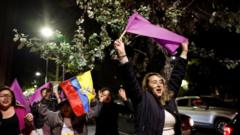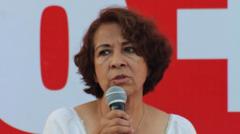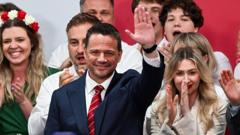Daniel Noboa is re-elected as Ecuador's president, attaining approximately 56% of the vote in a historic turn of events. Despite his strong stance on crime and gang violence, challenger Luisa González has rejected the results, alleging electoral fraud without evidence. The political landscape remains polarized as Noboa aims to prove his policies can effectively address the nation's security concerns.
Ecuador's Daniel Noboa Secures Re-election Amidst Claims of Fraud

Ecuador's Daniel Noboa Secures Re-election Amidst Claims of Fraud
President Daniel Noboa secures a decisive victory in Ecuador's presidential run-off, promising continued military action against criminal gangs while facing accusations of electoral fraud from rival Luisa González.
Ecuador’s president, Daniel Noboa, has been re-elected in the run-off round of the presidential elections, allowing him to fulfill a full term of four years. Noboa, who termed his victory as "historic," has been in office since November 2023 after a snap election. Throughout his short presidency, he has prioritized a military-led offensive against violent criminal gangs plaguing the nation, which has gained notoriety for its escalating violence.
In the aftermath of the election, Noboa asserted that there was "no doubt as to who the winner" was, as he received approximately 56% of the votes. Prior polls had suggested a much tighter race. "A victory of more than ten points and over 1 million votes leaves no doubt," he stated after the results were validated by the national electoral council. His triumph furnishes him with a mandate to double down on his campaign against drug trafficking and related gangs, leading to increased militarization on the streets and in prisons, as well as plans to construct new maximum-security facilities.
Noboa’s tough-on-crime policies include proposals for international military assistance, particularly from the United States and European nations, as he looks to combat rampant crime effectively. He has expressed intentions to amend the constitution to permit the return of foreign military bases that were outlawed during the presidency of Rafael Correa, a key figure in his opponent’s political alliances.
Although homicides showed a slight decrease during his presidency, violence remains alarmingly high, with over 780 murders reported in January alone. As citizens identified security as their paramount concern in pre-election surveys, Noboa bears the heavy responsibility of demonstrating his strategies are yielding tangible improvements. Economic issues including unemployment are also pressing.
Noboa experienced a drop in approval ratings last year, especially following severe droughts that prompted extensive power outages nationwide. Addressing this, he has proposed greater investments in renewable energy to diversify the electricity supply, predominantly dependent on hydropower. In recent weeks, he has sought to foster closer ties with the U.S. administration, recently implementing a 27% tariff on Mexican imports and rescinding his decree that granted amnesty to undocumented Venezuelan migrants.
In contrast to Noboa’s celebration, his left-wing challenger Luisa González has rejected the election outcome, alleging fraud and demanding a recount, without presenting supporting evidence—an essential requirement for any potential review of the results. This claim reflects concerns among her supporters, who feel disenfranchised, harking back to a perceived period of prosperity during Correa's years in office.
Noboa's campaign relied heavily on engaging the youth demographic, emphasizing job growth and infrastructure development, along with robust use of social media. Nevertheless, the political atmosphere in Ecuador remains tense and polarized, presenting ongoing challenges for Noboa as he seeks to unify a populace divided by party loyalties and historical grievances against the backdrop of economic and social instability.
In the aftermath of the election, Noboa asserted that there was "no doubt as to who the winner" was, as he received approximately 56% of the votes. Prior polls had suggested a much tighter race. "A victory of more than ten points and over 1 million votes leaves no doubt," he stated after the results were validated by the national electoral council. His triumph furnishes him with a mandate to double down on his campaign against drug trafficking and related gangs, leading to increased militarization on the streets and in prisons, as well as plans to construct new maximum-security facilities.
Noboa’s tough-on-crime policies include proposals for international military assistance, particularly from the United States and European nations, as he looks to combat rampant crime effectively. He has expressed intentions to amend the constitution to permit the return of foreign military bases that were outlawed during the presidency of Rafael Correa, a key figure in his opponent’s political alliances.
Although homicides showed a slight decrease during his presidency, violence remains alarmingly high, with over 780 murders reported in January alone. As citizens identified security as their paramount concern in pre-election surveys, Noboa bears the heavy responsibility of demonstrating his strategies are yielding tangible improvements. Economic issues including unemployment are also pressing.
Noboa experienced a drop in approval ratings last year, especially following severe droughts that prompted extensive power outages nationwide. Addressing this, he has proposed greater investments in renewable energy to diversify the electricity supply, predominantly dependent on hydropower. In recent weeks, he has sought to foster closer ties with the U.S. administration, recently implementing a 27% tariff on Mexican imports and rescinding his decree that granted amnesty to undocumented Venezuelan migrants.
In contrast to Noboa’s celebration, his left-wing challenger Luisa González has rejected the election outcome, alleging fraud and demanding a recount, without presenting supporting evidence—an essential requirement for any potential review of the results. This claim reflects concerns among her supporters, who feel disenfranchised, harking back to a perceived period of prosperity during Correa's years in office.
Noboa's campaign relied heavily on engaging the youth demographic, emphasizing job growth and infrastructure development, along with robust use of social media. Nevertheless, the political atmosphere in Ecuador remains tense and polarized, presenting ongoing challenges for Noboa as he seeks to unify a populace divided by party loyalties and historical grievances against the backdrop of economic and social instability.






















